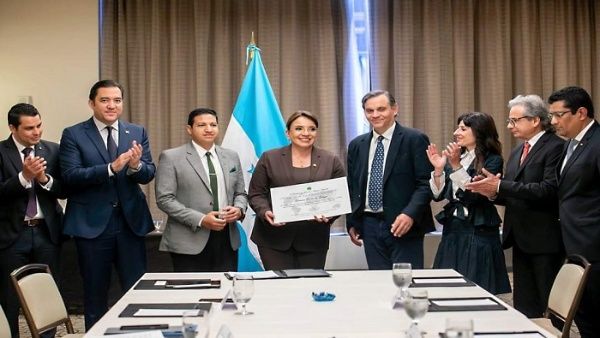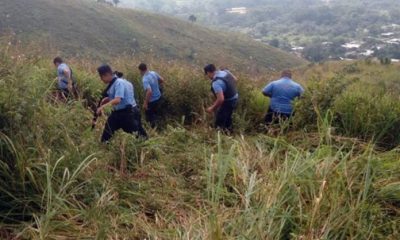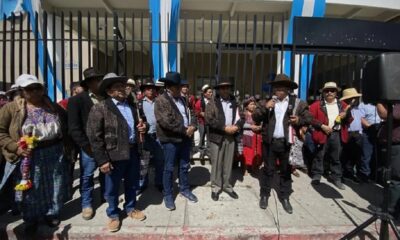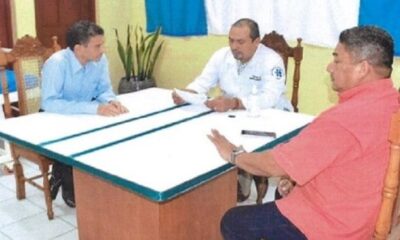Central America
Honduras chairs Coalition of Rainforest Nations

September 22 |
The president of Honduras, Xiomara Castro de Zelaya, received on Thursday the pro tempore presidency of the Coalition of Rainforest Nations, a position in which the country will manage an amount of 250 million dollars throughout the coming 2024 for the care and development of tropical forests worldwide.
The Central American leader also met with the executive director of the Coalition of Rainforest Nations, Kevin Conrad, with whom she discussed the policies promoted by her government for the protection and revitalization of forests.
Conrad emphasized that, after 18 months at the helm of the Honduran government, President Xiomara Castro has transformed the country from being one of the nations with no results whatsoever to one of the 52 most advanced countries in terms of forest conservation.
In a statement issued by the Honduran government, the head of the Secretariat of Natural Resources and Environment, Luky Medina, informed: “We would like to announce to the nation that President Xiomara Castro has assumed the pro tempore presidency of the Coalition of Rainforest Nations”.
For his part, Medina pointed out that “the coalition is the institution that mobilizes resources and payments for conservation of sovereign credits for carbon sequestration and has already made the necessary calculations so that the country can access some 250 million dollars starting in 2024”.
According to the Honduran Presidency, the resources that will be accessed will be reinvested in watershed management to ensure the continuity of the environmental protection battalions, avoid deforestation and continue the reforestation process in Honduras, which plans to restore a little more than one million hectares by 2030.
The Coalition of Rainforest Nations (Leaf Colition) brings together a community of 52 countries and has established itself as a block of strength in terms of management and negotiations on climate change, climate action and environmental justice.
Central America
Panama seizes over three tons of drugs hidden in Caribbean port container

Panama’s National Air and Naval Service (Senan) reported on Sunday the seizure of more than three metric tons of drugs that were concealed inside a shipping container at a port terminal on the country’s Caribbean coast.
According to a statement posted on X, Panamanian aeronaval authorities confirmed the confiscation of 3,205 packages of a suspected illicit substance hidden inside a container in transit through Panama, at a port facility in the Caribbean province of Colón. Each package typically weighs approximately one kilogram.
Earlier this week, Senan agents also seized an additional 2.2 metric tons of drugs and arrested five individuals, including a Colombian national, in separate operations linked to drug trafficking activities.
Panama serves as a major transit route for drugs produced in South America and destined mainly for the United States — the world’s largest consumer of cocaine — and Europe. According to official figures, Panamanian authorities seized approximately 80 metric tons of illicit substances in 2024.
Central America
Honduras election crisis deepens as CNE president denounces intimidation attempts

Tegucigalpa remains engulfed in a deep post-electoral crisis, marked by the absence of final results from the general elections held on November 30. On Thursday, the presiding counselor of the National Electoral Council (CNE), Ana Paola Hall, publicly denounced acts of intimidation that she warned could jeopardize the final phase of the process.
Following a meeting with the G-16+ diplomatic corps, Hall expressed concern over two specific incidents: a call by former president Manuel Zelaya summoning supporters of the Libre Party to gather outside the INFOP facilities—where electoral records and materials are being safeguarded—and a statement issued by the Permanent Commission of Congress accusing her and counselor Cossette López of alleged electoral crimes, an action she described as “baseless and outside their jurisdiction.”
Hall reaffirmed her institutional commitment and warned that she will not allow interference in the announcement of the results. “Honduras comes first,” she emphasized, underscoring her intention to defend the electoral process as a cornerstone of democracy.
Meanwhile, the preliminary results place Nasry ‘Tito’ Asfura, candidate of the National Party, in the lead with 40.52%of the vote, followed closely by Salvador Nasralla of the Liberal Party, with 39.48%. The ruling party’s candidate, Rixi Moncada of Libre, is in third place with 19.29%. Around 0.6% of the tally sheets—many of them showing inconsistencies—have yet to be reviewed.
The Organization of American States (OAS) called an extraordinary session of its Permanent Council to analyze the situation, while civil organizations and governments such as Paraguay’s urged respect for the popular will.
Honduran President Xiomara Castro accused the United States, and specifically former president Donald Trump, of obstructing the process, while also denouncing threats from gangs against voters aligned with her party.
Central America
OAS and EU urge honduran political actors to respect vote results and avoid unrest

The Electoral Observation Missions of the Organization of American States (OAS/EOM) and the European Union (EU EOM) issued an urgent call on Wednesday urging political actors in Honduras to respect the will expressed at the polls on November 30 and to refrain from inciting public disorder while the vote count is being finalized.
Both missions called on candidates, political parties, and authorities to act responsibly and maintain “active vigilance” over the vote-counting process.
So far, the National Electoral Council (CNE) has processed 99.4% of the tally sheets, but 2,773 still show inconsistencies, representing more than 500,000 unverified votes. The electoral body has not set a date for the special review, though it could begin later this week.
“The OAS/EOM reminds that electoral authorities are the only ones empowered to validate the results and reiterates its rejection of any call to disrupt public order,” the mission said in an official statement.
-

 International4 days ago
International4 days agoWashington declares State of Emergency as atmospheric river brings severe flooding
-

 International4 days ago
International4 days agoU.S. to require five-year social media history from tourists under Visa Waiver Program
-

 International3 days ago
International3 days agoCuba battles out-of-control dengue and chikungunya epidemic as death toll rises to 44
-

 Central America3 days ago
Central America3 days agoHonduras election crisis deepens as CNE president denounces intimidation attempts
-

 Central America4 days ago
Central America4 days agoOAS and EU urge honduran political actors to respect vote results and avoid unrest
-

 International3 days ago
International3 days agoColombia says it would not reject Maduro asylum request as regional tensions escalate
-

 International2 days ago
International2 days agoSeveral people shot in attack on Brown University campus
-

 International3 days ago
International3 days agoEcuador on track for record violence as homicides hit highest level in Latin America again
-

 International4 days ago
International4 days agoSix ecuadorian soldiers jailed pending trial for alleged extrajudicial execution
-

 International2 days ago
International2 days agoU.S. and Mexico Reach Deal to Address Water Deficit Under 1944 Treaty
-

 Central America11 hours ago
Central America11 hours agoPanama seizes over three tons of drugs hidden in Caribbean port container




































































































